The SSD Relapse: Understanding and Choosing the Best SSD
by Anand Lal Shimpi on August 30, 2009 12:00 AM EST- Posted in
- Storage
Why SSDs Care About What You Write: Fragmentation & Write Combining
PC Perspective's Allyn Malventano is a smart dude, just read one of his articles to figure that out. He pieced together a big aspect of how the X25-M worked on his own, a major key to how to improve SSD performance.
You'll remember from the Anthology that SSDs get their high performance by being able to write to multiple flash die across multiple channels in parallel. This works very well for very large files since you can easily split the reads and writes across multiple die/channels.
Here we go to write a 128KB file, it's split up and written across multiple channels in our tiny mock SSD:
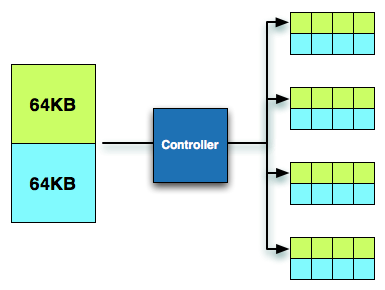
When we go to read the file, it's read across multiple channels and performance is once again, excellent.
Remember what we talked about before however: small file random read/write performance is actually what ends up being slowest on hard drives. It's what often happens on a PC and thus we run into a problem when performing such an IO. Here we go to write a 4KB file. The smallest size we can write is 4KB and thus it's not split up at all, it can only be written to a single channel:
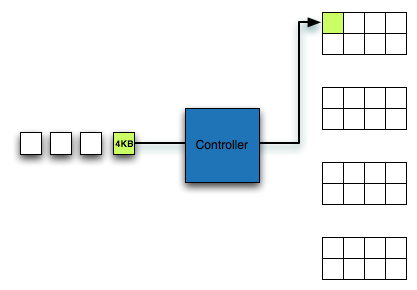
As Alyn discovered, Intel and other manufacturers get around this issue by combining small writes into larger groups. Random writes rarely happen in a separated manner, they come in bursts with many at a time. A write combining controller will take a group of 4KB writes, arrange them in parallel, and then write them together at the same time.
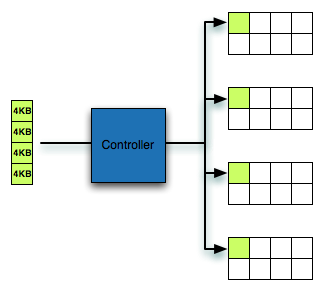
This does wonders for improving random small file write performance, as everything completes as fast as a larger sequential write would. What it hurts is what happens when you overwrite data.
In the first example where we wrote a 128KB file, look what happens if we delete the file:
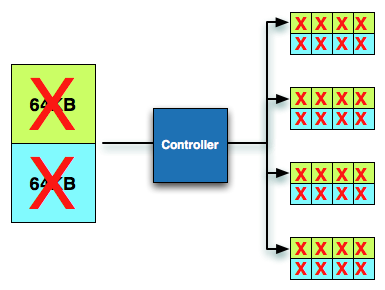
Entire blocks are invalidated. Every single LBA in these blocks will come back invalid and can quickly be cleaned.
Look at what happens in the second example. These 4KB fragments are unrelated, so when one is overwritten, the rest aren't. A few deletes and now we're left with this sort of a situation:
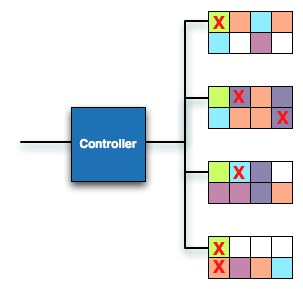
Ugh. These fragmented blocks are a pain to deal with. Try to write to it now and you have to do a read-modify-write. Without TRIM support, nearly every write to these blocks will require a read-modify-write and send write amplification through the roof. This is the downside of write combining.
Intel's controller does its best to recover from these situations. That's why its used random write performance is still very good. Samsung's controller isn't very good at recovering from these situations.
Now you can see why performing a sequential write over the span of the drive fixes a fragmented drive. It turns the overly fragmented case into one that's easy to deal with, hooray. You can also see why SSD degradation happens over time. You don't spend all day writing large sequential files to your disk. Instead you write a combination of random and sequential, large and small files to the disk.










295 Comments
View All Comments
Anand Lal Shimpi - Monday, August 31, 2009 - link
I believe OCZ cut prices to distributors that day, but the retail prices will take time to fall. Once you see X25-M G2s in stock then I'd expect to see the Indilinx drives fall in price. Resellers won't give you a break unless they have to :)Take care,
Anand
bobjones32 - Monday, August 31, 2009 - link
Another great AnandTech article, thanks for the read.Just a head's-up on the 80GB X-25m Gen2 - A day before Newegg finally had them on sale, they bumped their price listing from $230 to $250. They sold at $250 for about 2 hours last Friday, went back out of stock until next week, and bumped the price again from $250 to $280.
So....plain supply vs. demand is driving the price of the G2 roughly $50 higher than it was listed at a week ago. I have a feeling that if you wait a week or two, or shop around a bit, you'll easily find them selling elsewhere for the $230 price they were originally going for.
AbRASiON - Monday, August 31, 2009 - link
Correct, Newegg has gouged the 80gb from 229 to 279 and the 160gb from 449 to 499 :(Stan Zaske - Monday, August 31, 2009 - link
Absolutely first rate article Anand and I thoroughly enjoyed reading it. Get some rest dude! LOLJaramin - Monday, August 31, 2009 - link
I'm wondering, if I were to use a low capacity SSD to install my OS on, but install my programs to a HDD for space reasons, just how much would that spoil the SSD advantage? All OS reads an writes would still be on the SSD, and the paging file would also be there. I'm very curious about the amount of degradation one would see relative to different use routines and apps.Anand Lal Shimpi - Monday, August 31, 2009 - link
Putting all of your apps (especially frequently used ones) off of your SSD would defeat the purpose of an SSD. You'd be missing out on the ultra-fast app launch times.Pick a good SSD and you won't have to worry too much about performance degradation. As long as you don't stick it into a database server :)
Take care,
Anand
swedishchef - Tuesday, September 1, 2009 - link
What if you just put your photoshop cache on a pair of Velociraptors? Would it be the same loss of benefit?I have the same question regarding uncompressed HD video work, where I need write speeds well over the Intel x25-m ( over 240Mb/s). My assumption would be that I could enjoy the fast IO and App. launch of an SSD and increase CPU performance with the SSD while keeping the files on a fast external or internal raid configuration.
Thank you again for a a brilliant Article Anand.
I have been waiting for it for a long time. Yours are the only calm words out on the net.
Grateful Geek /Also professional image creator.
creathir - Monday, August 31, 2009 - link
Great article Anand. I've been waiting for it...My only thoughts are, why can't Intel get their act together with the sequential business? Why can the others handle it, but they can't? To have such an awesome piece of hardware have such a nasty blemish is strange to me, especially on a Gen-2 product.
I suppose there is some technical reason as to why, but it needs to be addressed.
- Creathir
Anand Lal Shimpi - Monday, August 31, 2009 - link
If Intel would only let me do a deep dive on their controller I'd be able to tell you :) There's more I'd like to say but I can't yet unfortunately.Take care,
Anand
shotage - Monday, August 31, 2009 - link
Awesome article!I'm intrigued with the cap on the sequential reads that Intel has on the G2 drives as well. I always thought it was strange to see even on their first gen stuff.
I'm assuming that this cap might be in place to somehow ensure the excellent performance they are giving with random read/writes. All until TRIM finally shows up and you'll have to write up another full on review (which I eagerly await!).
I can't wait to see what 2010 brings to the table. What with the next version of SATA and TRIM just over the horizon, I could finally get the kind of performance out of my PC that I want!!